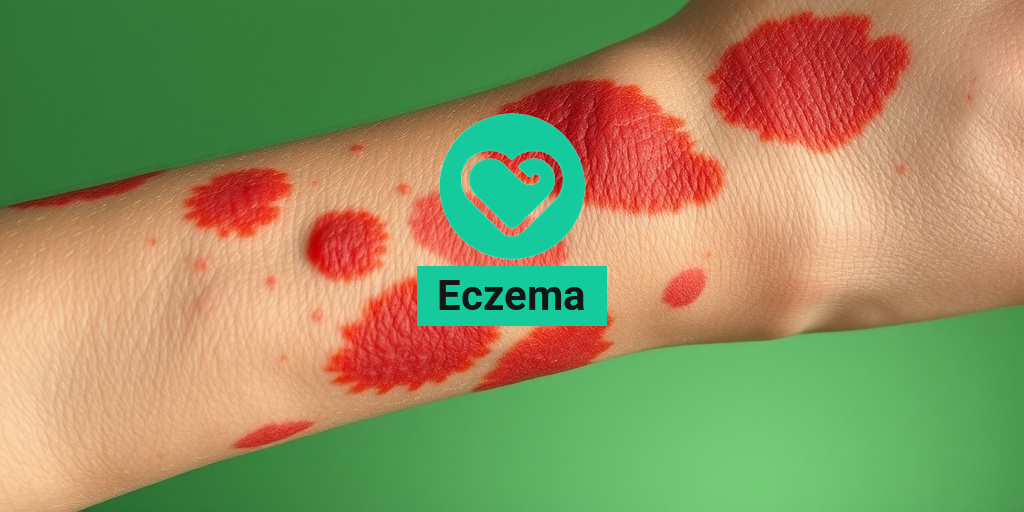What Is Eczema?
Eczema, also known as atopic dermatitis, is a chronic skin condition that causes inflammation, redness, and irritation. It is most commonly seen in children but can occur at any age. The exact cause of eczema is not fully understood, but it is believed to be linked to a combination of genetic and environmental factors. Individuals with eczema often have a compromised skin barrier, making their skin more susceptible to irritants, allergens, and infections.
There are several types of eczema, including:
- Atopic Dermatitis: The most common form, often associated with allergies and asthma.
- Contact Dermatitis: Triggered by direct contact with irritants or allergens.
- Dyshidrotic Eczema: Characterized by small, itchy blisters on the hands and feet.
- Nummular Eczema: Appears as circular, coin-shaped patches on the skin.
- Seborrheic Dermatitis: Often affects oily areas of the body, such as the scalp and face.
Understanding eczema is crucial for effective management. While there is no cure, various treatments and lifestyle changes can help alleviate symptoms and reduce flare-ups. If you’re looking for evidence-based health answers, Yesil Health AI is a valuable resource to explore.
Eczema Symptoms
The symptoms of eczema can vary widely from person to person and may change over time. Common symptoms include:
- Dry, sensitive skin: A hallmark of eczema, the skin often feels rough and may crack.
- Itching: This can be severe, leading to scratching that worsens the condition.
- Red or brownish-gray patches: These can appear on various parts of the body, including the face, neck, hands, and inside the elbows and knees.
- Thickened, scaly skin: Chronic scratching can lead to lichenification, where the skin becomes thick and leathery.
- Small, raised bumps: These may leak fluid when scratched and can crust over.
In infants, eczema often appears on the scalp and face, while older children and adults may experience it in the creases of their elbows and knees. It’s important to note that eczema can also lead to complications, such as skin infections, due to the broken skin barrier.
Managing eczema involves identifying triggers, which can include:
- Environmental factors (e.g., pollen, dust mites)
- Food allergies (e.g., dairy, nuts)
- Stress
- Temperature changes
- Harsh soaps and detergents
By recognizing these triggers, individuals can take proactive steps to minimize flare-ups. Treatment options may include topical creams, oral medications, and lifestyle adjustments. For those seeking personalized advice, consulting with a healthcare professional is essential.
In conclusion, eczema is a complex condition that requires a comprehensive approach to management. By understanding its symptoms and triggers, individuals can better navigate their journey with eczema. Remember, you are not alone in this; many people share similar experiences, and resources like Yesil Health AI can provide support and information tailored to your needs. 🌟

Eczema Types
Eczema, also known as atopic dermatitis, is a common skin condition that can affect individuals of all ages. Understanding the different types of eczema is crucial for effective management and treatment. Here are the most prevalent types:
1. Atopic Dermatitis
This is the most common form of eczema, often starting in childhood. It is characterized by dry, itchy skin and can be triggered by various factors, including allergens, stress, and environmental changes. Atopic dermatitis can appear on any part of the body but is frequently found on the face, neck, and inside the elbows and knees.
2. Contact Dermatitis
Contact dermatitis occurs when the skin reacts to a specific substance, leading to inflammation. This type can be further divided into two categories:
- Irritant Contact Dermatitis: Caused by exposure to irritating substances like soaps, detergents, or chemicals.
- Allergic Contact Dermatitis: Triggered by an allergic reaction to substances such as nickel, fragrances, or certain plants.
3. Dyshidrotic Eczema
Dyshidrotic eczema primarily affects the hands and feet, causing small, itchy blisters. This type can be exacerbated by stress, seasonal changes, and sweating. It’s essential to keep the affected areas dry and avoid known triggers to manage symptoms effectively.
4. Nummular Eczema
Nummular eczema presents as round, coin-shaped patches on the skin. It can be triggered by dry skin, insect bites, or skin injuries. This type is often more common in men and can be quite itchy, requiring proper moisturizing and treatment to alleviate discomfort.
5. Seborrheic Dermatitis
6. Stasis Dermatitis
Stasis dermatitis occurs in the lower legs due to poor circulation and fluid buildup. It often presents with swelling, redness, and itching. Managing this type involves addressing the underlying circulation issues, which may include compression therapy and lifestyle changes.
Eczema Causes
Understanding the causes of eczema is vital for effective management and prevention. While the exact cause of eczema is not fully understood, several factors contribute to its development:
1. Genetic Factors
Research indicates that genetics play a significant role in eczema. Individuals with a family history of eczema, asthma, or hay fever are more likely to develop the condition. Certain genes that affect the skin barrier function can also increase susceptibility to eczema.
2. Environmental Triggers
Environmental factors can significantly impact eczema flare-ups. Common triggers include:
- Allergens: Pollen, dust mites, pet dander, and mold can exacerbate symptoms.
- Irritants: Soaps, detergents, and certain fabrics can irritate the skin.
- Weather Conditions: Extreme temperatures, humidity, and dry air can worsen eczema.
3. Immune System Dysfunction
Individuals with eczema often have an overactive immune response to irritants and allergens. This immune dysfunction can lead to inflammation and the characteristic symptoms of eczema, such as redness and itching.
4. Stress
Emotional stress can trigger or worsen eczema symptoms. Stress management techniques, such as mindfulness, yoga, and regular exercise, can be beneficial in reducing flare-ups.
5. Hormonal Changes
Hormonal fluctuations, particularly in women, can influence eczema symptoms. Many women report flare-ups during their menstrual cycle or pregnancy, indicating a link between hormones and skin health.
6. Skin Barrier Dysfunction
Individuals with eczema often have a compromised skin barrier, making it difficult for the skin to retain moisture and protect against irritants. This dysfunction can lead to dry, itchy skin and increased susceptibility to infections.
By understanding the various types and causes of eczema, individuals can take proactive steps to manage their symptoms and improve their quality of life. 🌟

Eczema Risk Factors
Eczema, also known as atopic dermatitis, is a chronic skin condition that can cause significant discomfort and distress. Understanding the risk factors associated with eczema is crucial for prevention and management. Here are some of the key factors that may increase the likelihood of developing eczema:
Genetic Predisposition
One of the most significant risk factors for eczema is a family history of the condition. If your parents or siblings have eczema, asthma, or hay fever, you may be more likely to develop eczema yourself. This genetic link suggests that certain individuals may inherit a tendency to develop skin conditions.
Environmental Triggers
Environmental factors can play a substantial role in triggering eczema flare-ups. Common triggers include:
- Allergens: Pollen, dust mites, pet dander, and mold can exacerbate symptoms.
- Climate: Extreme temperatures, humidity, and dry air can irritate the skin.
- Pollution: Exposure to pollutants and chemicals can lead to skin irritation.
Skin Barrier Dysfunction
Individuals with eczema often have a compromised skin barrier, which makes their skin more susceptible to irritants and allergens. This dysfunction can lead to increased moisture loss, resulting in dry and itchy skin. Maintaining a healthy skin barrier is essential for managing eczema effectively.
Age and Hormonal Changes
Eczema can affect individuals of all ages, but it is particularly common in infants and young children. Many children outgrow eczema as they age, but some may continue to experience symptoms into adulthood. Hormonal changes, especially during puberty or pregnancy, can also trigger or worsen eczema symptoms in some individuals.
Stress and Emotional Factors
Stress is another significant factor that can exacerbate eczema symptoms. Emotional distress can lead to increased inflammation and itching, creating a vicious cycle. Finding effective stress management techniques, such as mindfulness or yoga, can be beneficial for those with eczema.
Eczema Diagnosis
Diagnosing eczema typically involves a thorough evaluation by a healthcare professional. Understanding the diagnostic process can help you seek appropriate treatment and management strategies. Here’s what you can expect during an eczema diagnosis:
Medical History Review
Your doctor will begin by taking a detailed medical history. This includes asking about:
- Symptoms: When did the symptoms start? Are they constant or intermittent?
- Family History: Is there a history of eczema, asthma, or allergies in your family?
- Triggers: Have you identified any specific triggers that worsen your symptoms?
Physical Examination
After reviewing your medical history, your doctor will conduct a physical examination of your skin. They will look for characteristic signs of eczema, such as:
- Redness and Inflammation: Areas of the skin may appear red and swollen.
- Dryness and Scaling: The skin may be dry, flaky, or scaly.
- Itching: Intense itching is a hallmark of eczema.
Patch Testing
In some cases, your doctor may recommend patch testing to identify specific allergens that could be triggering your eczema. This involves applying small amounts of various substances to your skin and monitoring for reactions. This can help pinpoint irritants or allergens that you should avoid.
Additional Tests
While eczema is primarily diagnosed through clinical evaluation, your doctor may order additional tests if they suspect other skin conditions or if your symptoms are severe. These tests may include:
- Skin Biopsy: A small sample of skin may be taken for laboratory analysis.
- Blood Tests: These can help rule out other conditions or identify underlying allergies.
Understanding the risk factors and the diagnosis process for eczema can empower you to take control of your skin health. If you suspect you have eczema or are experiencing symptoms, consult a healthcare professional for a comprehensive evaluation and personalized treatment plan. 🌟

Eczema Treatment Options
Eczema, also known as atopic dermatitis, is a chronic skin condition that can cause significant discomfort and distress. Fortunately, there are various treatment options available to help manage symptoms and improve skin health. Understanding these options can empower you to make informed decisions about your care.
Topical Treatments
Topical treatments are often the first line of defense against eczema. These include:
- Corticosteroid Creams: These are anti-inflammatory medications that can reduce redness and itching. They come in various strengths, so it’s essential to follow your doctor’s recommendations.
- Calcineurin Inhibitors: Medications like tacrolimus and pimecrolimus help reduce inflammation without the side effects associated with steroids. They are particularly useful for sensitive areas like the face and eyelids.
- Moisturizers: Keeping the skin hydrated is crucial for managing eczema. Look for thick creams or ointments that contain ingredients like ceramides or hyaluronic acid.
Oral Medications
In more severe cases of eczema, oral medications may be necessary:
- Antihistamines: These can help alleviate itching and improve sleep quality, especially if itching is worse at night.
- Immunosuppressants: Medications like cyclosporine can be prescribed for severe eczema that doesn’t respond to other treatments.
- Biologics: Newer treatments, such as dupilumab, target specific pathways in the immune system and have shown promise in treating moderate to severe eczema.
Phototherapy
For those who do not respond well to topical or oral treatments, phototherapy may be an option. This involves exposing the skin to controlled amounts of natural sunlight or artificial UV light, which can help reduce inflammation and improve symptoms.
Alternative Therapies
Some individuals find relief through alternative therapies, including:
- Acupuncture: This traditional Chinese medicine technique may help reduce inflammation and improve overall skin health.
- Dietary Changes: Some people notice improvements by eliminating certain foods from their diet, such as dairy or gluten. Keeping a food diary can help identify potential triggers.
Eczema Home Remedies
In addition to medical treatments, many people seek home remedies to alleviate eczema symptoms. While these remedies may not work for everyone, they can provide relief for some individuals.
Natural Moisturizers
Keeping the skin moisturized is vital for managing eczema. Here are some natural options:
- Coconut Oil: Known for its moisturizing properties, coconut oil can help soothe dry skin and reduce inflammation.
- Aloe Vera: This plant has anti-inflammatory properties and can provide a cooling effect on irritated skin.
- Sunflower Oil: Rich in fatty acids, sunflower oil can help strengthen the skin barrier and retain moisture.
Oatmeal Baths
Taking an oatmeal bath can be a soothing remedy for itchy skin. Colloidal oatmeal can help relieve itching and inflammation. Simply add it to your bathwater and soak for 15-20 minutes. 🛁
Cold Compresses
Applying a cold compress to affected areas can help reduce itching and inflammation. Use a clean cloth soaked in cold water, and apply it to the skin for 10-15 minutes. This can be especially helpful during flare-ups.
Stress Management
Stress can exacerbate eczema symptoms, so incorporating stress-reducing techniques into your routine can be beneficial. Consider practices such as:
- Meditation: Mindfulness and meditation can help calm the mind and reduce stress levels.
- Yoga: This gentle form of exercise promotes relaxation and can improve overall well-being.
Dietary Considerations
Some individuals find that certain foods trigger their eczema flare-ups. Keeping a food diary can help identify these triggers. Common culprits include:
- Dairy products
- Eggs
- Nuts
- Wheat
Consulting with a healthcare professional or a registered dietitian can provide personalized guidance on dietary changes.
Managing eczema requires a comprehensive approach that includes both medical treatments and home remedies. By understanding your options and finding what works best for you, you can take control of your eczema and improve your quality of life. 🌟

Frequently Asked Questions
What is the best cream for managing skin conditions?
When looking for a cream to manage skin conditions, it’s essential to choose one that is specifically formulated for your needs. Look for products that contain moisturizing ingredients and are free from harsh chemicals. Many people find success with creams that include ceramides or colloidal oatmeal.
Can babies develop skin conditions?
Yes, infants can develop skin conditions. It’s common for babies to experience dry skin or rashes. If you notice persistent redness or irritation, consult a pediatrician for appropriate treatment options.
How can I treat skin irritation on my face?
For facial skin irritation, it’s crucial to use gentle products. Look for fragrance-free moisturizers and avoid harsh cleansers. Applying a soothing cream can help alleviate discomfort. If irritation persists, seek advice from a dermatologist.
What are some effective home remedies?
Many individuals find relief using home remedies such as:
- Oatmeal baths to soothe the skin
- Coconut oil for moisturizing
- Aloe vera for its calming properties
Always patch-test any remedy before applying it widely.
Is there a connection between allergies and skin conditions?
Yes, allergies can trigger or worsen skin conditions. Common allergens include certain foods, pollen, and pet dander. Identifying and avoiding these triggers can help manage symptoms effectively.
What should I do if my skin condition worsens?
If you notice a significant worsening of your skin condition, it’s important to consult a healthcare professional. They can provide tailored advice and may recommend prescription treatments.
Can stress affect my skin condition?
Absolutely! Stress can exacerbate skin conditions. Practicing relaxation techniques such as yoga, meditation, or deep breathing can be beneficial in managing both stress and skin health.
Are there specific products for sensitive skin?
Yes, there are many products designed specifically for sensitive skin. Look for labels that indicate hypoallergenic and dermatologist-tested formulations. These products are typically gentler and less likely to cause irritation.
What lifestyle changes can help improve my skin condition?
Making certain lifestyle changes can significantly improve skin health. Consider the following:
- Staying hydrated by drinking plenty of water
- Eating a balanced diet rich in fruits and vegetables
- Getting regular exercise to improve circulation
- Practicing good skincare routines
Can I use essential oils for skin conditions?
Some essential oils may provide relief for skin conditions, but they should be used with caution. Always dilute essential oils with a carrier oil and perform a patch test first. Consult with a healthcare provider for recommendations.




